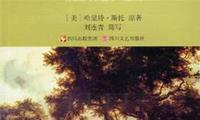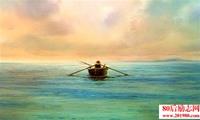老人與海英文讀後感200字(一)
the Old Man and the Sea is one of Hemingway's most enduring works and may very well become one of the true classics of this generation. It played a GREat part in his winning the Pulizer Prize in 1953 and the 1954 Novel Prize for Literature and confirmed his power and presence in the literary world. Hemingway is also one of my favorite writers. Besides The Old Man And the Sea, I have read some of his other works, such as The Sun Also Rises, A Farewell to Arms and The Snow of Kilimanijaro. But The Old Man and the Sea is the one that left the deepest impression on me.
I first read this book when I was in my fifteens. And now I remember it just as well as if I had read it yesterday.
Pride and Prejudice is a chefdoeuvre.
My first impression of this story was from screen.
老人與海英文讀後感200字(二)
It's long long ago, maybe before I can read english books.() I don't remember which movie edition I had seen. But I was impressed by the music, the scenery and the costume. I was very favor of a section of music in its balls. It's
pretty brisk, liked a wonderful song of a bird. Regarding to the characters, I liked Elizabeth, the heroine,though I didn't think she's beautiful. But she's smart. However, I didn't pay much attention to the plot. I thought it's so long that it made me impatient and bored. By now, I haven't read the whole story in English or its Chinese version, either. I owe it to my prejudice.
In fact, I didn't understand the story at that time. I didn't know why it called Pride and Prejudice. Of course someone was pride, but I didn't find where' s the prejudice. I thought it's normal, the way people treated each other in that. I considered prejudice would be very disgusting.
老人與海讀後感英文版
When I was a middle school student, I’ve finished this book in Chinese.But when I read it in English,I really gain something new both in the way of expression and the spirit it shows to us.May be different ages to read the same book we will learn different things from it.At least, for my part, that is true.
Firstly,I would like to review some information about this book.Such as the background,major characters and the topic of it.
The Old Man and the Sea is a story by Ernest Hemingway, written in Cuba in 1951 and published in 1952. It was the last major work of fiction to be produced by Hemingway and published in his lifetime. One of his most famous works, it centers upon Santiago, an aging Cuban fisherman who struggles with a giant marlin far out in the Gulf Stream.
The Old Man and the Sea served to reinvigorate Hemingway's literary reputation and prompted a reexamination of his entire body of work. The novella was initially received with much popularity; it restored many readers' confidence in Hemingway's capability as an author. Its publisher, Scribner's, on an early dust jacket, called the novella a "new classic," and many critics favorably compared it with such works as William Faulkner's "The Bear" and Herman Melville's Moby-Dick.
This book gives me a deep impression especially the description about the man’s braveness and persistence.
In this book, in order to suggest the profundity of the old man’s sacrifice and the glory that derives from it, Hemingway purposefully likens Santiago to Christ, who, according to Christian theology, gave his life for the greater glory of humankind. Crucifixion imagery is the most noticeable way in which Hemingway creates the symbolic parallel between Santiago and Christ. When Santiago’s palms are first cut by his fishing line, the reader cannot help but think of Christ suffering his stigmata. Later, when the sharks arrive, Hemingway portrays the old man as a crucified martyr, saying that he makes a noise similar to that of a man having nails driven through his hands. Furthermore, the image of the old man struggling up the hill with his mast across his shoulders recalls Christ’s march toward Calvary. Even the position in which Santiago collapses on his bed—face down with his arms out straight and the palms of his hands up—brings to mind the image of Christ suffering on the cross. Hemingway employs these images in the final pages of the novella in order to link Santiago to Christ, who exemplified transcendence by turning loss into gain, defeat into triumph, and even death into renewed life.
The major characters in this book are also vivid and lively.
Santiago?,the old man of the novella’s title, Santiago is a Cuban fisherman who has had an extended run of bad luck. Despite his expertise, he has been unable to catch a fish for eighty-four days. He is humble, yet exhibits a justified pride in his abilities. His knowledge of the sea and its creatures, and of his craft, is unparalleled and helps him preserve a sense of hope regardless of circumstance.
The marlin?,Santiago hooks the marlin, which we learn at the end of the novella measures eighteen feet, on the first afternoon of his fishing expedition. Manolin?,a boy presumably in his adolescence, Manolin is Santiago’s apprentice and devoted attendant. The old man first took him out on a boat when he was merely five years old. Due to Santiago’s recent bad luck, Manolin’s parents have forced the boy to go out on a different fishing boat. Manolin, however, still cares deeply for the old man, to whom he continues to look as a mentor.
Joe DiMaggio, although DiMaggio never appears in the novel, he plays a significant role nonetheless. Santiago worships him as a model of strength and commitment, and his thoughts turn toward DiMaggio whenever he needs to reassure himself of his own strength. Perico ?,Perico, the reader assumes, owns the bodega in Santiago’s village. He never appears in the novel, but he serves an important role in the fisherman’s life by providing him with newspapers that report the baseball scores. This act establishes him as a kind man who helps the aging Santiago.
Martin,like Perico, Martin, a café owner in Santiago’s village, does not appear in the story. The reader learns of him through Manolin, who often goes to Martin for Santiago’s supper. As the old man says, Martin is a man of frequent kindness who deserves to be repaid.
From the very first paragraph, Santiago is characterized as someone struggling against defeat. He has gone eighty-four days without catching a fish—he will soon pass his own record of eighty-seven days. Almost as a reminder of Santiago’s struggle, the sail of his skiff resembles “the flag of permanent defeat.” But the old man refuses defeat at every turn: he resolves to sail out beyond the other fishermen to where the biggest fish promise to be. He lands the marlin, tying his record of eighty-seven days after a brutal three-day fight, and he continues to ward off sharks from stealing his prey, even though he knows the battle is useless.
Because Santiago is pitted against the creatures of the sea, some readers choose to view the tale as a chronicle of man’s battle against the natural world, but the novella is, more accurately, the story of man’s place within nature. Both Santiago and the marlin display qualities of pride, honor, and bravery, and both are subject to the same eternal law: they must kill or be killed. As Santiago reflects when he watches the weary warbler fly toward shore, where it will inevitably meet the hawk, the world is filled with predators, and no living thing can escape the inevitable struggle that will lead to its death. Santiago lives according to his own observation: “man is not made for defeat . . . [a] man can be destroyed but not defeated.” In Hemingway’s portrait of the world, death is inevitable, but the best men (and animals) will nonetheless refuse to give in to its power. Accordingly, man and fish will struggle to the death, just as hungry sharks will lay waste to an old man’s trophy catch.
The novel suggests that it is possible to transcend this natural law. In fact, the very inevitability of destruction creates the terms that allow a worthy man or beast to transcend it. It is precisely through the effort to battle the inevitable that a man can prove himself. Indeed, a man can prove this determination over and over through the worthiness of the opponents he chooses to face. Santiago finds the marlin worthy of a fight, just as he once found “the great negro of Cienfuegos” worthy. HSantiago, though destroyed at the end of the novella, is never defeated. Instead, he emerges as a hero. Santiago’s struggle does not enable him to change man’s place in the world. Rather, it enables him to meet his most dignified destiny.
While it is certainly true that Santiago’s eighty-four-day run of bad luck is an affront to his pride as a masterful fisherman, and that his attempt to bear out his skills by sailing far into the gulf waters leads to disaster, Hemingway does not condemn his protagonist for being full of pride. On the contrary, Santiago stands as proof that pride motivates men to greatness. Because the old man acknowledges that he killed the mighty marlin largely out of pride, and because his capture of the marlin leads in turn to his heroic transcendence of defeat, pride becomes the source of Santiago’s greatest strength. Without a ferocious sense of pride, that battle would never have been fought, or more likely, it would have been abandoned before the end.
Santiago’s pride also motivates his desire to transcend the destructive forces of nature. Throughout the novel, no matter how baleful his circumstances become, the old man exhibits an unflagging determination to catch the marlin and bring it to shore. When the first shark arrives, Santiago’s resolve is mentioned twice in the space of just a few paragraphs. Even if the old man had returned with the marlin intact, his moment of glory, like the marlin’s meat, would have been short-lived. The glory and honor Santiago accrues comes not from his battle itself but from his pride and determination to fight.
Santiago dreams his pleasant dream of the lions at play on the beaches of Africa three times. The first time is the night before he departs on his three-day fishing expedition, the second occurs when he sleeps on the boat for a few hours in the middle of his struggle with the marlin, and the third takes place at the very end of the book. In fact, the sober promise of the triumph and regeneration with which the novella closes is supported by the final image of the lions. Because Santiago associates the lions with his youth, the dream suggests the circular nature of life. Additionally, because Santiago imagines the lions, fierce predators, playing, his dream suggests a harmony between the opposing forces—life and death, love and hate, destruction and regeneration—of nature.
This book gives me courage of conquering all kinds of difficulties .And I have the belief that the most beautiful thing is the process that we make our best to achieve our dream,and never say give up .
返老還童讀後感(一)
《返老還童》這部電影可以說得上是一部史詩級的巨片。它所講述的故事構思非常精巧——一個人反向的人生。我們都知道,人的正常生長規律是從小到老,而這部影片的主人公的生長規律卻是反向的,他是從老到小。從一個遲暮的耄耋老人直到變成一個看似剛剛呱呱落地的嬰兒,最後死去。
在新奧爾良,一家醫院當中,垂暮老人黛西讓女兒拿出一本日記,並讓女兒朗讀,故事就從那本日記開始。一戰戰火剛剛吹熄的1918年,
《返老還童》不僅給我們很好地講述了一段感人肺腑的愛情故事,同時也更好地給我們表現了人生的真實意義所在——一切都沒有永恆。很多人懼怕死亡,而人的衰老會讓人更加接近死亡。
片中有一句經典的話:“你永遠不知道下一刻會發生什麼。”人的命運是不可預測的,有些事情,假如事情當中的某個人物發生了某些改變,哪怕是小小的、微不足道的改變,可能就會改變整個事情的發展,甚至會改變一個人的人生。
令我印象深刻的,還有令本傑明受益終身的邁克船長臨終前給本傑明的忠告:“你可以像瘋狗一樣對周圍的一切憤憤不平,
兩個人截然不同的生活軌道,也可能會有交集的那一天。這也是《返老還童》傳達給我們的一個理念,
電影末尾說,有的人註定是在河邊長大,有的人註定被閃電擊中過,有的人註定對音樂有超凡的天賦,有的人註定是船長,有的人註定是舞者,也有的人註定是母親。可見每個人來到這個世上都是帶著使命而來的,每個人都註定會對這個世界有所幫助,只是或小或大而已。現在很多自卑人士都認為自己無用,這其實是沒有道理的。縱使是蟑螂老鼠這些平日裡不招人喜歡的動物都有自己的作為,何況是人呢?每個人都有自己的有點,有些只是尚待發掘而已,只要你肯去努力,努力去實現自己的價值,那麼有一天成功就將會不期而至。如果你首先對自己都失去了信心,那麼成功也就對你事去了信心,不會再青睞你,那樣你就註定一輩子都消沉下去。所以,請堅信,你是上帝派來的造福于世的天使,而並非是一無用處的草包。
《返老還童》所帶給我的心靈和思想震撼,遠高於我以前看過的任何一部電影。它所詮釋的是一種崇高的哲學意義,所講述的是一段精彩繽紛的人生故事。而它所呈現給我們的更是一部磅礴的反向人生畫卷。我尤為希望看過此篇文章的朋友也能去欣賞一下這部史詩級的作品,享受一次思想的洗禮,感受一下人生的真正意義所在。
返老還童讀後感(二)
一個如此晦氣(怪異的生命形態,一出生就帶來母親的死亡)的傢伙也會遇到疼愛他的天使。
年輕的生命應該站在高處眺望未來,雖然有洶湧的波濤,隱藏的礁石,瘋狂的颶風,但是我們眺望的姿態能夠掠過這些,總會看到蔚藍的天空,潔白的海鷗,若現的蜃樓。
誰知道這樣的外表下隱藏的是一顆怎樣的心靈?此時的本傑明正處於青春年少的年紀,對成人的世界充滿好奇。()不相稱的外表讓他受到人們的質疑,遇上自詡藝術家的拖船船長帶領他走進了與外表一直的生活。他離開了地面,開始了在海上的生活;他離開了家,一個人在外面成長了。為獨立生活的你我加油,生活是美好的。
很久之前就聽說了《返老還童》這部電影,但是因為很多原因一直沒有機會去看。這幾天情緒特別糟糕,總是有股莫名其妙的鬱悶在心中翻騰不已。可能是性格原因,就算是心情在糟糕,也不會外見,看看電影、聽聽音樂、做做運動這些方式多少會平衡一下內心的波動。晚上懷著不平靜的心情看完了《返老還童》這部電影,影片以一本日記內容為載體,將本傑明的不尋常的一生向我們娓娓道來。沒有波瀾起伏的情節,一切平淡自然,給人帶來一種異常沉靜的感受。
其實未看之前認為情節屬於荒誕類型的,看完之後卻依然帶給人真切自然的感受。有時候一些與事實完全相反的事情帶給人的震撼和感動比正常的事情會多好幾倍。年齡從小到大是不可改變的自然規律,軀體和面貌從老到年輕確實可能出現的,今天流覽新聞的時候就看到這樣的一個報導:一個花樣年紀的小夥子卻滿臉皺紋,外形上看去像是耄耋老人。這些真實的新聞就發生在我們身邊,影片中只不過是誇大化而已,看來說其荒誕有點不適合。
慢慢的變得越來越年輕其實是悲哀的,因為你必須得承受所愛的人慢慢變老,甚至是死亡。人的生命從年輕到衰老是自然規律,誰一旦違背了就會承受後果。雖然違背自然規律可能是上帝的惡意,但是必須需要生命個體去承受。本傑明的出生導致母親的死亡,他來到這個世界上帶來了親人的悲痛和拋棄。奇異的生命現象在慈善機構中得到了接受,那裡有各種各樣奇異的人,但是每一個個體都是上帝賜予的一段生命,儘管上帝在賜予生命的時候有所疏忽,但是還是應該受到珍惜和關愛。在那樣的一個大環境裡,和諧和關愛充溢了整個空間,本傑明很自然的像正常的小孩子一樣慢慢長大。
這樣的一個逆生命,同大眾所擁有的生命歷程其實一樣,擁有年輕時候的那段美好歲月,不同的只是外形與年齡相反而已。其實現代人似乎都有類似這種生命歷程的趨勢,只不過沒有如此誇張罷了。如今,紛繁的社會充斥著各種文化,資訊的飛速傳播,無疑在加快人們成長的速度。現代人成長的速度比正常速度會快上一倍甚至是兩倍。小孩子的臉上佈滿的憂傷,讓人感覺他們似乎經受太多歲月的磨難,老年人追逐年輕的心態,讓人看到生命的活力。小孩過早成熟,青年人未老先衰,老年人返老還童,呈現的不就是一種逆轉的生命現象嗎?
耐心的看完歷時兩個小時的影片,躁動的心情也平復了。一個人的生命歷程濃縮在短短的兩個小時之間,期間包括生命中存在的親情、愛情、友情。影片的漫長卻反襯出生命的短暫,人的一生就是短短的幾十年,在每一個時間段,都會有預期安排好的事情等著我們做。駐足回首過往,所以的一切似乎都是一種安排和巧合。有言說命運掌握在自己手裡,可以靠自己的努力去改變命運的安排。可是事情就是會在我們努力想要去改變的時候如期發生了。雖然我們可以很欣慰的認為自己已經努力了,自己已經改變了,但是在上帝看來我們是可愛的。
人活著,毫無掙扎的去服從命運的安排其實會很幸福的,因為上帝是仁慈的。但是人們總是想拼命的推翻上帝為我們安排的一切,試圖單憑個人努力去實現心中的想法。其間的辛酸和苦楚,收穫和喜悅貫穿了生命的過程,待到生命終結的那一刻無怨無悔,也不枉來人世走一遭,這或許就是人生吧。
有的人註定被閃電擊中過,有的人註定對音樂有超凡的天賦,有的人註定是船長,有的人註定是舞者,也有的人註定是母親。可見每個人來到這個世上都是帶著使命而來的,每個人都註定會對這個世界有所幫助,只是或小或大而已。現在很多自卑人士都認為自己無用,這其實是沒有道理的。縱使是蟑螂老鼠這些平日裡不招人喜歡的動物都有自己的作為,何況是人呢?每個人都有自己的有點,有些只是尚待發掘而已,只要你肯去努力,努力去實現自己的價值,那麼有一天成功就將會不期而至。如果你首先對自己都失去了信心,那麼成功也就對你事去了信心,不會再青睞你,那樣你就註定一輩子都消沉下去。所以,請堅信,你是上帝派來的造福于世的天使,而並非是一無用處的草包。《返老還童》所帶給我的心靈和思想震撼,遠高於我以前看過的任何一部電影。它所詮釋的是一種崇高的哲學意義,所講述的是一段精彩繽紛的人生故事。而它所呈現給我們的更是一部磅礴的反向人生畫卷。我尤為希望看過此篇文章的朋友也能去欣賞一下這部史詩級的作品,享受一次思想的洗禮,感受一下人生的真正意義所在。
返老還童讀後感(二)
一個如此晦氣(怪異的生命形態,一出生就帶來母親的死亡)的傢伙也會遇到疼愛他的天使。
年輕的生命應該站在高處眺望未來,雖然有洶湧的波濤,隱藏的礁石,瘋狂的颶風,但是我們眺望的姿態能夠掠過這些,總會看到蔚藍的天空,潔白的海鷗,若現的蜃樓。
誰知道這樣的外表下隱藏的是一顆怎樣的心靈?此時的本傑明正處於青春年少的年紀,對成人的世界充滿好奇。()不相稱的外表讓他受到人們的質疑,遇上自詡藝術家的拖船船長帶領他走進了與外表一直的生活。他離開了地面,開始了在海上的生活;他離開了家,一個人在外面成長了。為獨立生活的你我加油,生活是美好的。
很久之前就聽說了《返老還童》這部電影,但是因為很多原因一直沒有機會去看。這幾天情緒特別糟糕,總是有股莫名其妙的鬱悶在心中翻騰不已。可能是性格原因,就算是心情在糟糕,也不會外見,看看電影、聽聽音樂、做做運動這些方式多少會平衡一下內心的波動。晚上懷著不平靜的心情看完了《返老還童》這部電影,影片以一本日記內容為載體,將本傑明的不尋常的一生向我們娓娓道來。沒有波瀾起伏的情節,一切平淡自然,給人帶來一種異常沉靜的感受。
其實未看之前認為情節屬於荒誕類型的,看完之後卻依然帶給人真切自然的感受。有時候一些與事實完全相反的事情帶給人的震撼和感動比正常的事情會多好幾倍。年齡從小到大是不可改變的自然規律,軀體和面貌從老到年輕確實可能出現的,今天流覽新聞的時候就看到這樣的一個報導:一個花樣年紀的小夥子卻滿臉皺紋,外形上看去像是耄耋老人。這些真實的新聞就發生在我們身邊,影片中只不過是誇大化而已,看來說其荒誕有點不適合。
慢慢的變得越來越年輕其實是悲哀的,因為你必須得承受所愛的人慢慢變老,甚至是死亡。人的生命從年輕到衰老是自然規律,誰一旦違背了就會承受後果。雖然違背自然規律可能是上帝的惡意,但是必須需要生命個體去承受。本傑明的出生導致母親的死亡,他來到這個世界上帶來了親人的悲痛和拋棄。奇異的生命現象在慈善機構中得到了接受,那裡有各種各樣奇異的人,但是每一個個體都是上帝賜予的一段生命,儘管上帝在賜予生命的時候有所疏忽,但是還是應該受到珍惜和關愛。在那樣的一個大環境裡,和諧和關愛充溢了整個空間,本傑明很自然的像正常的小孩子一樣慢慢長大。
這樣的一個逆生命,同大眾所擁有的生命歷程其實一樣,擁有年輕時候的那段美好歲月,不同的只是外形與年齡相反而已。其實現代人似乎都有類似這種生命歷程的趨勢,只不過沒有如此誇張罷了。如今,紛繁的社會充斥著各種文化,資訊的飛速傳播,無疑在加快人們成長的速度。現代人成長的速度比正常速度會快上一倍甚至是兩倍。小孩子的臉上佈滿的憂傷,讓人感覺他們似乎經受太多歲月的磨難,老年人追逐年輕的心態,讓人看到生命的活力。小孩過早成熟,青年人未老先衰,老年人返老還童,呈現的不就是一種逆轉的生命現象嗎?
耐心的看完歷時兩個小時的影片,躁動的心情也平復了。一個人的生命歷程濃縮在短短的兩個小時之間,期間包括生命中存在的親情、愛情、友情。影片的漫長卻反襯出生命的短暫,人的一生就是短短的幾十年,在每一個時間段,都會有預期安排好的事情等著我們做。駐足回首過往,所以的一切似乎都是一種安排和巧合。有言說命運掌握在自己手裡,可以靠自己的努力去改變命運的安排。可是事情就是會在我們努力想要去改變的時候如期發生了。雖然我們可以很欣慰的認為自己已經努力了,自己已經改變了,但是在上帝看來我們是可愛的。
人活著,毫無掙扎的去服從命運的安排其實會很幸福的,因為上帝是仁慈的。但是人們總是想拼命的推翻上帝為我們安排的一切,試圖單憑個人努力去實現心中的想法。其間的辛酸和苦楚,收穫和喜悅貫穿了生命的過程,待到生命終結的那一刻無怨無悔,也不枉來人世走一遭,這或許就是人生吧。







